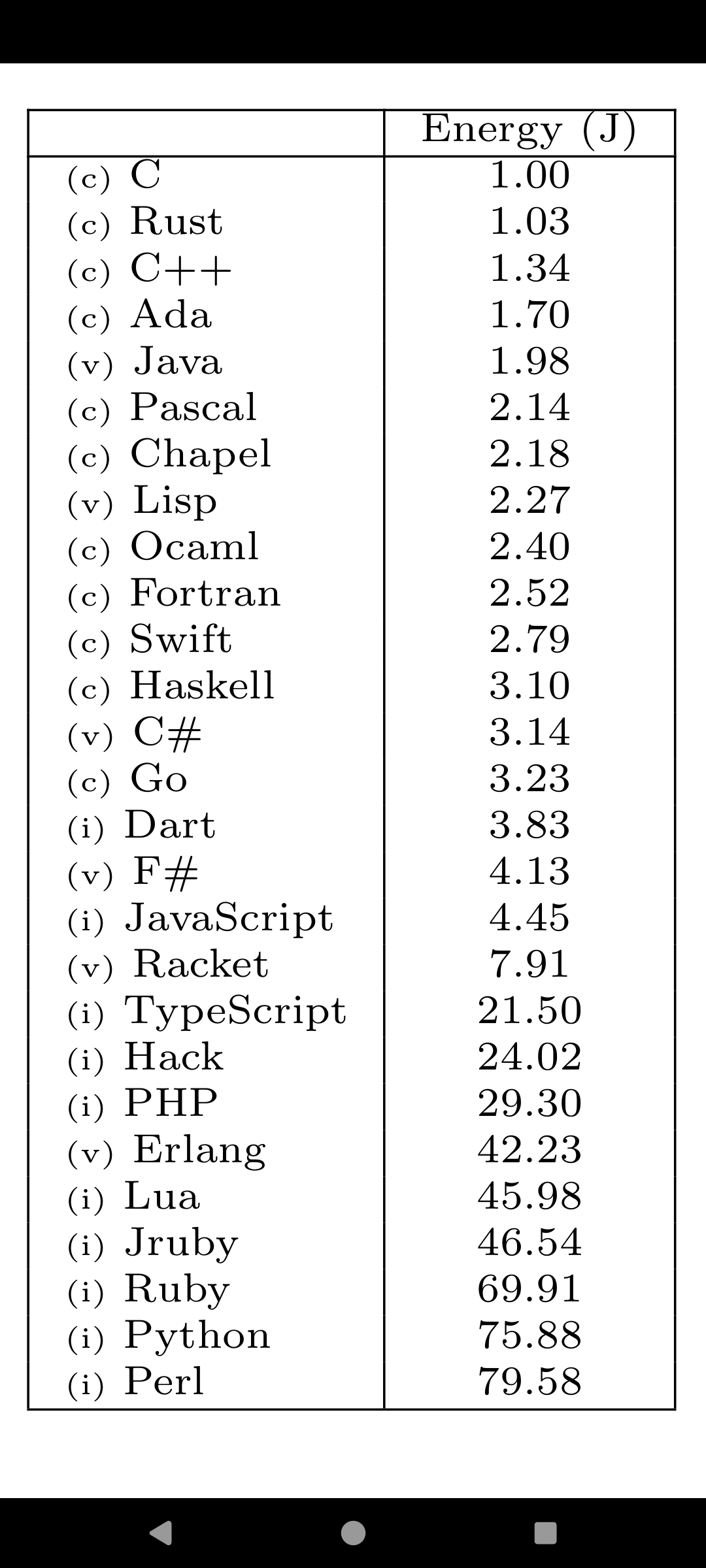cross-posted from: https://lemmy.world/post/31184706
C is one of the top languages in terms of speed, memory and energy
https://www.threads.com/@engineerscodex/post/C9_R-uhvGbv?hl=en
To run perhaps. But what about the same metrics for debugging? How many hours do we spend debugging c/c++ issues?
True but it’s also a cock to write in
What if we make a new language that extends it and makes it fun to write? What if we call it c+=1?
This doesn’t account for all the comfort food the programmer will have to consume in order to keep themselves sane
Machine energy, definitely not programmer energy ;)
I would argue that because C is so hard to program in, even the claim to machine efficiency is arguable. Yes, if you have infinite time for implementation, then C is among the most efficient, but then the same applies to C++, Rust and Zig too, because with infinite time any artificial hurdle can be cleared by the programmer.
In practice however, programmers have limited time. That means they need to use the tools of the language to save themselves time. Languages with higher levels of abstraction make it easier, not harder, to reach high performance, assuming the abstractions don’t provide too much overhead. C++, Rust and Zig all apply in this domain.
An example is the situation where you need a hash map or B-Tree map to implement efficient lookups. The languages with higher abstraction give you reusable, high performance options. The C programmer will need to either roll his own, which may not be an option if time Is limited, or choose a lower-performance alternative.
I understand your point but come on, basic stuff has been implemented in a thousand libraries. There you go, a macro implementation
And how testable is that solution? Sure macros are helpful but testing and debugging them is a mess
I’m not saying you can’t, but it’s a lot more work to use such solutions, to say nothing about their quality compared to std solutions in other languages.
And it’s also just one example. If we bring multi-threading into it, we’re opening another can of worms where C doesn’t particularly shine.
Not sure I understand your comment on multithreading. pthreads are not very hard to use, and you have stuff like OpenMP if you want some abstraction. What about C is not ideal for multithreading?
It’s that the compiler doesn’t help you with preventing race conditions. This makes some problems so hard to solve in C that C programmers simply stay away from attempting it, because they fear the complexity involved.
It’s a variation of the same theme: Maybe a C programmer could do it too, given infinite time and skill. But in practice it’s often not feasible.
Memory management, but that impacts stability/security instead of performance.
The C programmer will need to either roll his own, which may not be an option if time Is limited, or choose a lower-performance alternative.
What are you talking about? https://docs.gtk.org/glib/data-structures.html
Well, let’s be real: many C programs don’t want to rely on Glib, and licensing (as the other reply mentioned) is only one reason. Glib is not exactly known for high performance, and is significantly slower than the alternatives supported by the other languages I mentioned.
OK, think of all the other C collection libraries there must be out there!
Which one should I pick then, that is both as fast as the std solutions in the other languages and as reusable for arbitrary use cases?
Because it sounds like your initial pick made you loose the machine efficiency argument and you can’t have it both ways.
Glib us licensed under LGPL. So unless your project is happy with that, it’s as if it didn’t exist. That’s one of the problems of having a small standard library.
It’s a single counterexample. there are many, many such libraries for C and the programmer does not have to roll their own.
For those who don’t want to open threads, it’s a link to a paper on energy efficiency of programming languages.
Results

For Haskell to land that low on the list tells me they either couldn’t find a good Haskell programmer and/or weren’t using GHC.
Wonder what they used for the JS state since it’s dependent on the runtime.
Also the difference between TS and JS doesn’t make sense at first glance. 🤷♂️ I guess I need to read the research.
My first thought is perhaps the TS is not targeting ESNext so they’re getting hit with polyfills or something
It does, the “compiler” adds a bunch of extra garbage for extra safety that really does have an impact.
I thought the idea of TS is that it strongly types everything so that the JS interpreter doesn’t waste all of its time trying to figure out the best way to store a variable in RAM.
TS is compiled to JS, so the JS interpreter isn’t privy to the type information. TS is basically a robust static analysis tool
The code is ultimately ran in a JS interpreter. AFAIK TS transpiles into JS, there’s no TS specific interpreter. But such a huge difference is unexpected to me.
Its really not, have you noticed how an enum is transpiled? you end up with a function… a lot of other things follow the same pattern.
Nope, have not noticed because I hate JavaScript with a passion. Thanks for educating me.
Only if you choose a lower language level as the target. Given these results I suspect the researchers had it output JS for something like ES5, meaning a bunch of polyfills for old browsers that they didn’t include in the JS-native implementation…
Not really, because this stuff also happens: https://stackoverflow.com/questions/20278095/enums-in-typescript-what-is-the-javascript-code-doing a function call always has an inpact.
Yeah sure, you found the one notorious TypeScript feature that actually emits code, but a) this feature is recommended against and not used much to my knowledge and, more importantly, b) you cannot tell me that you genuinely believe the use of TypeScript enums – which generate extra function calls for a very limited number of operations – will 5x the energy consumption of the entire program.
This isn’t true, there are other features that “emit code”, that includes: namespaces, decorators and some cases even async / await (when targeting ES5 or ES6).
Care to elaborate?
Here’s a good example: https://stackoverflow.com/questions/47363996/why-does-an-enum-transpile-into-a-function
That is not a good example. That is an immediate function call happening once when the program starts and certainly does not have a large impact like you are suggesting.
Every time I get surprised by the efficiency of Lisp! I guess they mean Common Lisp there, not Clojure or any modern dialect.
Yeah every time I see this chart I think “unless it’s performance critical, realtime, or embedded, why would I use anything else?” It’s very flexible, a joy to use, amazing interactive shell(s). Paren navigation is awesome. The build/tooling is not the best, but it is manageable.
That said, OCaml is nice too.
For Lua I think it’s just for the interpreted version, I’ve heard that LuaJIT is amazingly fast (comparable to C++ code), and that’s what for example Löve (game engine) uses, and probably many other projects as well.
I guess we can take the overhead of rust considering all the advantages. Go however… can’t even.
Even Haskell is higher on the list than Go, which surprises me a lot
But Go has go faster stripes in the logo! Google wouldn’t make false advertising, would they?
Now we just need a language with flames in the logq
Looking at the Energy/Time ratios (lower is better) on page 15 is also interesting, it gives an idea of how “power hungry per CPU cycle” each language might be. Python’s very high
WASM would be interesting as well, because lots of stuff can be compiled to it to run on the web
Indeed, here’s an example - my climate-system model web-app, written in scala running (mainly) in wasm
(note: that was compiled with scala-js 1.17, they say latest 1.19 does wasm faster, I didn’t yet compare).
[ Edit: note wasm variant only works with most recent browsers, maybe with experimental options set - if not try without ?wasm ]I have no clue what I am looking at but it is absolutely mesmerizing.

Oh, it’s designed for a big desktop screen, although it just happens to work on mobile devices too - their compute power is enough, but to understand the interactions of complex systems, we need space.
I would be interested in how things like MATLAB and octave compare to R and python. But I guess it doesn’t matter as much because the relative time of those being run in a data analysis or research context is probably relatively low compared to production code.
Is there a lot of computation-intensive code being written in pure Python? My impression was that the numpy/pandas/polars etc kind of stuff was powered by languages like fortran, rust and c++.
The popular well crafted ones are, but not all are well crafted.
I have a hard time believing Java is that high up. I’d place it around c#.
Why?
(A super slimmed down flavour of) Java runs on fucking simcards.
In theory Java is very similar to C#, an IL based JIT runtime with a GC, of course. So where is the difference coming from between the two? How is it better than pascal, a complied language? These are the questions I’m wondering about.
And it powers a lot of phones. People generally don’t like it when their phone needs to charge all the freaking time.
I ran Linux with KDE on my phone for a while and it for sure needed EVEN MORE charging all the time even though most of the system is C, with a sprinkle of C++ and QT.
But that is probably due to other inefficiencies and lack of optimization (which is fine, make it work first, optimize later)
Yeah, and Android has had some 16 years of “optimize later”. I have some very very limited experience with writing mobile apps and while I found it to be a PITA, there is clearly a lot of thought given to how to not eat all the battery and die in the ecosystem there. I would expect that kind of work to also be done at the JVM level.
If Windows Mobile had succeeded, C# likely would’ve been lower as well, just because there’d be more incentive to make a battery charge last longer.
C# has been very optimized since .NET Core (now .NET). Also jit compiler and everything around it.
Because usually they use the super fat flavor of Java. Jabba Fatt tier of lardiness Java.
I’m using the fattest of java (Kotlin) on the fattest of frameworks (Spring boot) and it is still decently fast on a 5 year old raspberry pi. I can hit precise 50 μs timings with it.
Imagine doing it in fat python (as opposed to micropython) like all the hip kids.
deleted by creator
Perl is disappointing too. I always considered it as an etalon shit-script.
etalon
/ˈɛtəlɒn/
noun Physics
noun: etalon; plural noun: etalonsa device consisting of two reflecting glass plates, employed for measuring small differences in the wavelength of light using the interference it produces.
I don’t see how that word makes sense in that phrase
English doesn’t have this word? Read it as a “standard unit”.
That definitely raised an eyebrow for me. Admittedly I haven’t looked in a while but I thought I remembered perl being much more performant than ruby and python
Does the paper take into account the energy required to compile the code, the complexity of debugging and thus the required re-compilations after making small changes? Because IMHO that should all be part of the equation.
They compile each benchmark solution as needed, following the CLBG guidelines, but they do not measure or report the energy consumed during the compilation step.
Time to write our own paper with regex and compiler flags.
and in most cases that’s not good enough to justify choosing c
I just learned about Zig, an effort to make a better C compatible language. It’s been really good so far, I definitely recommend checking it out! It’s early stages for the community, but the core language is pretty developed and is a breath of fresh air compared to C.
For raw computation, yes. Most programs aren’t raw computation. They run in and out of memory a lot, or are tapping their feet while waiting 2ms for the SSD to get back to them. When we do have raw computation, it tends to be passed off to a C library, anyway, or else something that runs on a GPU.
We’re not going to significantly reduce datacenter energy use just by rewriting everything in C.
We’re not going to significantly reduce datacenter energy use just by rewriting everything in C.
We would however introduce a lot of bugs in the critical systems

Your link links to facebook that links to https://haslab.github.io/SAFER/scp21.pdf
Written in 2021 and not including julia is weird imo. I’m not saying it’s faster but one should include it in a comparison.
And they used bit.ly on page 5 for references.
Haven’t read it yet, but already seems very non-serious to me.
I also didn’t read it. There’s lots of good comparisons already











